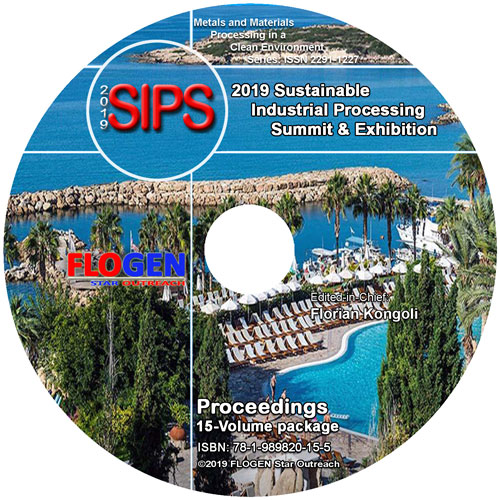2019-Sustainable Industrial Processing Summit
SIPS2019 Volume 15: Oxidative Stress for Sustainable Development of Human Beings
| Editors: | F. Kongoli, H. Inufusa, C. Amatore, H.Y. Chen, W.H. Huang, T. Yoshikawa |
| Publisher: | Flogen Star OUTREACH |
| Publication Year: | 2019 |
| Pages: | 64 pages |
| ISBN: | 978-1-989820-14-8 |
| ISSN: | 2291-1227 (Metals and Materials Processing in a Clean Environment Series) |

CD shopping page
The Effect of Ginseng on Human Antioxidant Capacity
Hiroshi Ichikawa1; Yuta Noguchi2; Maryam Shafei2; Chiharu Myo2; Keiko Kobayashi3; Yukiko Minamiyama4; Haruhiko .Inufusa5; Toshikazu Yoshikawa6;1DOSHISHA UNIVERSITY, Kyotanabe City, Japan; 2MAJOR OF MEDICAL LIFE SYSTEMS, GRADUATE SCHOOL OF LIFE AND MEDICAL SCIENCES, DOSHISHA UNIVERSITY, Kyotanabe City, Japan; 3KYOTO PREFECTURAL UNIVERSITY, Kyoto, Japan; 4KYOTO PREFECTURAL UNIVERSITY, KYoto, Japan; 5CEO, TIMA/GIFU UNIVERSITY, Osaka, Japan; 6LOUIS PASTEUR CENTER FOR MED. RES., Tohoku, Japan;
Type of Paper: Regular
Id Paper: 219
Topic: 54
Abstract:
Ginseng has been reported about for its immunostimulation and its effects on various diseases such as obesity, diabetes and cancer. In this study, from the viewpoint of antioxidant and oxidative stress, the influence of ginseng on humans was examined. By using the MULTIple free-radical Scavenging (MULTIS method), we measured the scavenging activity of the reactive oxygen species: hydroxyl radical (・OH), superoxide radical (O2・-), alkyloxy radical (RO・), alkyl peroxy radical (ROO・), methyl radical (・CH3), and singlet oxygen (1O2). We also evaluated the antioxidant capacity multifaceted.
On the first day, subjects’ samples (plasma and saliva) were taken before ingesting ginseng tablets (n=5). After that, the samples were taken again, 4 hours after the administration of 18 tablets. They continued taking 18 tablets per day from the second day to the sixth day. On the seventh day, the samples were collected. The antioxidant capacity of the samples was examined using the MULTIS method.
By ingestion of ginseng tablets, the ・OH scavenging activity of samples increased after 1 week. Also, plasma ・CH3, and saliva O2・- scavenging activity increased. It was suggested that ginseng improved the antioxidant capacity of human.
Keywords:
Aging; Bacterial flora;References:
1. Chasing great paths of Helmut Sies "Oxidative Stress".Majima HJ, Indo HP, Nakanishi I, Suenaga S, Matsumoto K, Matsui H, Minamiyama Y, Ichikawa H, Yen HC, Hawkins CL, Davies MJ, Ozawa T, St Clair DK
Archives of biochemistry and biophysics 595 54-60 2016
2. A mitochondrial superoxide theory for oxidative stress diseases and aging
Indo Hiroko P., Yen Hsiu-Chuan, Nakanishi Ikuo, Matsumoto Ken-ichiro, Tamura Masato, Nagano Yumiko, Matsui Hirofumi, Gusev Oleg, Cornette Richard, Okuda Takashi, Minamiyama Yukiko, Ichikawa Hiroshi, Suenaga Shigeaki, Oki Misato, Sato Tsuyoshi, Ozawa Toshihiko, St Clair Daret K., Majima Hideyuki J.
JOURNAL OF CLINICAL BIOCHEMISTRY AND NUTRITION 56(1) 1-7 2015